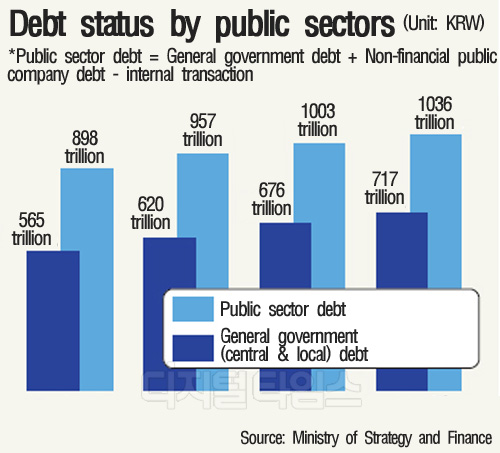Public enterprises with debt in Management evaluation ‘trap’
Kwon Dae Gyung | kwon213@ | 2017-12-29 11:31:49

According to the analysis of the government`s `D3 (Public sector debt) and `Revision plan of public institution management evaluation system` on December 28, the debt of the top five public corporations (non-financial) increased respectively. LH, as of the end of last year, had a debt of KRW 120.6 trillion. LH`s debt amounted to KRW 123 trillion last year, slightly less than 128 trillion trillion won in 2014, but it is still difficult to normalize the business with debt burden of more than 100 trillion won.
Besides, KEPCO and its power generation subsidiaries have reached KRW 88.7 trillion in debt, which is smaller than in 2015 (KRW 92.4 trillion) and 2014 (KRW 93.9 trillion), but it is overwhelmingly larger than other companies . In the last three years, the total liabilities of these five companies have fallen from KRW 303.1 trillion in 2014 to KRW 293.4 trillion in 2015, to KRW 285.9 trillion last year, but the vicious cycle of debt-producing debt continues.
The problem is that the amount of debt reduction by top-tier firms such as LH and KEPCO may be large in terms of amount, but it is very low compared to the total. The actual LH re-paid KRW 2.4 trillion a year from 2015 to 2016, but only 1.95% of the total debt. Even if the top five public corporations reduce their debt by 10 trillion won each year, it is calculated that it will take another 28 years to cancel debt.
Meanwhile, the management evaluation standards of these public corporations will be transformed into a form that reflects public function and social value from next year.
The revised bill on the public agency management evaluation confirmed by the government has significantly strengthened the scope of reflecting social values of public institutions on December 28. Which means, job creation, equal opportunities and social integration, safety and environment, win-win cooperation and regional development, and contribution to ethical management. In the end, public corporations cannot help but focus on increasing costs such as hiring, improving the working environment, and reducing the incomes of low-income families.
While the Korean government has been trying to reduce debt by leading public enterprises to improve management, both inside and outside of the country, they have been asking for more bloodshed by demanding more public jobs and social projects.
Yang Jun-mo, a professor at Yonsei University, pointed out, "We should not step on the railway which passed the government burden to the public enterprise ." The market-type public corporation itself is a market type, The government should take responsibility for what the government needs to do, such as supporting the hierarchy. "
Sejong= By Kwon Dae Gyung kwon213@
